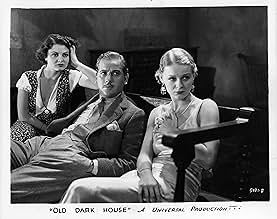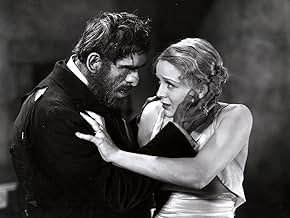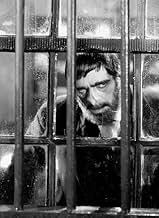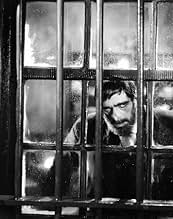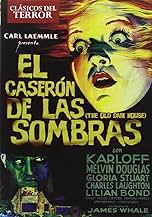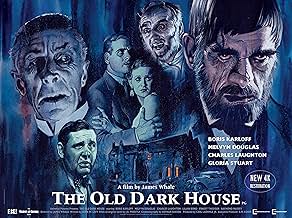Seeking shelter from a storm, five travelers are in for a bizarre and terrifying night when they stumble upon the Femm family estate.Seeking shelter from a storm, five travelers are in for a bizarre and terrifying night when they stumble upon the Femm family estate.Seeking shelter from a storm, five travelers are in for a bizarre and terrifying night when they stumble upon the Femm family estate.
- Director
- Writers
- Stars
- Awards
- 1 nomination total
- Director
- Writers
- All cast & crew
- Production, box office & more at IMDbPro
Featured reviews
While perfectly enjoyable as a camp comedy of manners (that element comes courtesy of director James Whale) and as an elegant, low-key horror, The Old Dark House can best be appreciated when you know a little about JB Priestley, author of the source play Benighted. (Or was it originally a novel? It definitely exists as a stage play, at any rate.)
Priestley was an English playwright, novelist, radio broadcaster and journalist who became very well known in Britain in the 1930s and 1940s for presenting a kindly, commonsensical version of socialism and community spirit to a nation battling through the Great Depression, the Second World War and its aftermath. Several of his plays combine a supernatural or at least mysterious strain with an allegorical message about the importance of unselfishness and people working together to help one another. If you watch The Old Dark House with these points in mind you may see it in a more moving and profound light. Dangerous Corner and An Inspector Calls are similar examples of his work, still popular in Britain with amateur drama groups and touring theatre companies.
If you can, see Old Dark House and Whale's later Bride of Frankenstein as a home video double bill and compare Ernest Thesiger's delightfully feline and remarkably similar performances as Horace Femm and Dr Praetorius. "Have a potato" and "Have some gin" may well become part of your private family language for ever after.
Priestley was an English playwright, novelist, radio broadcaster and journalist who became very well known in Britain in the 1930s and 1940s for presenting a kindly, commonsensical version of socialism and community spirit to a nation battling through the Great Depression, the Second World War and its aftermath. Several of his plays combine a supernatural or at least mysterious strain with an allegorical message about the importance of unselfishness and people working together to help one another. If you watch The Old Dark House with these points in mind you may see it in a more moving and profound light. Dangerous Corner and An Inspector Calls are similar examples of his work, still popular in Britain with amateur drama groups and touring theatre companies.
If you can, see Old Dark House and Whale's later Bride of Frankenstein as a home video double bill and compare Ernest Thesiger's delightfully feline and remarkably similar performances as Horace Femm and Dr Praetorius. "Have a potato" and "Have some gin" may well become part of your private family language for ever after.
Truly one of Universal greatest unsung horror films, The Old Dark House is a unique blend of gothic setting, quirky characterizations, wicked black and dry humour, a great ensemble cast, and the workings of the mind of James Whale. Whale made the film the year after Frankenstein. He was again paired with Karloff. But unlike their first association, Karloff's star is far less brighter in this film as his performance, although good and servicable, is over-shadowed by atmosphere, Whale's direction, witty dialogue, and a cast of scene stealers such as Melvyn Douglas, Charles Laughton, Eva Moore, and Ernest Thesiger. Others in the notable cast include lovely Gloria Stuart, Lillian Bond, and Raymond Massey. Thesiger and Moore, as the brother and sister imposed upon by travellers in the stormy night, are fantastic as they interact and play out their eccentricities to perfection. Thesiger has the choice lines in the film as the effeminate Horace Femm, a cowardly man that cowers to his deaf sister. He is a joy to watch and each of his lines oozes with oil. Moore is also very good as she bellows repeatedly, "N beds! No beds! They can have no beds!" The story is based on a novel by J. B. Priestly. The plot is somewhat antiquated now, but Whale's direction puts a lot of life into it. And let's not forget Karloff, however small his part, still turns in a great menacing performance as a lecherous, drunken servant named Morgan ogling Gloria Stuart from the moment he sees her. The Old Dark House is a great film, and it should be more highly touted by Universal!
It's a funny experience when a film evokes déjà vu, only to realize the source of the déjà vu is, itself, intended to itself incite déjà vu. Picture this: a miserable storm sweeps a carload of normal people, as earnest as they are bedraggled, into taking refuge at a spooky old manor, only to be besieged and coveted by the prurient, camp Gothic inmates. But don't do the Time Warp again just yet: at the core of this Russian Doll of horror, pastiche, and dark humour lurks James Whale's oft-overlooked but seldom forgotten mini- masterpiece – The Old Dark House. As Poe-faced as if the script had been quoth by the Raven itself, Whale's film is, if not the granddaddy of most horror clichés, then at least the wry, drunken great-uncle. And, weathered as it is, time has been kind to this one, making The Old Dark House a creepy, clever, and sordidly amusing addition to the pantheon of horror classics. Singing not included; pelvic thrusting barely omitted.
If nothing else, The Old Dark House makes for a fascinating transitional tonal touch-point for Whale, one of the defining masters of classical horror. The film isn't as overtly satirical and camp as Whale's later monster mash-terpieces, The Invisible Man and, especially, Bride of Frankenstein, but it certainly shows him creeping in that direction, with a persistent snicker of irreverent naughtiness under its raspy breath. This isn't to say the film is an outright farce - indeed, Whale runs the gamut of thematic leitmotifs that would proceed to become preoccupations for decades of horror to follow: dogmatic religion, lurid sexuality, class discrepancies, and shunned, disabled family members. Yet, his film crackles with an invigorating, nervy energy, and his characters banter with zingy, pre-screwball fury, with several double-entendres pushing the boundaries of Hays Code knuckle-rapping with cheeky aplomb (maybe Whale assumed American censors wouldn't understand them through the Welsh accents?).
His setup is certainly foreboding enough, with the harried car ride prelude across flooding, lightning-scarred Welsh countryside a perfectly ominous amuse-bouche for the sinister, Gothic castle theatrics to come. Whale's flair for atmospheric mise-en-scène is superb, peppering the film with marvelously spooky flourishes and Expressionist lighting keeping the audience biting their nails throughout (one bit, where a woman makes shadow puppets on the wall with her hands, only to have a dark figure emerge from the shadow, is a jump scare for the ages). But Whale bides his time, keeping his pacing cunningly slow and allowing his film to froth at the mouth with looming tension.
Whale's film is also remarkable for the unprecedented access the audience is given to his cabal of characters. Too many horror films introduce characters as disposable (and disposed of) props, but Whale treats the first half of his potboiler like a theatre piece, as the growing crowd of storm refugees and reluctant hosts meet, and poke hopes, dreams, prejudices, and – mostly – fears out of each other. Whale's ensemble rises to the challenge, delivering genuinely well-crafted and compelling characters, particularly the suave, sharp-tongued Melvyn Douglas, the tough but chipper Lilian Bond, and, especially, Charles Laughton, who gives a remarkably heartfelt performance, his effete bluster whisking away to reveal a man plagued by terrible loneliness underneath. His monologue, revealing his bitter turn to capitalism as a means of finding purpose and escaping past tragedy, is strangely tragic and surprisingly moving amidst the film's tongue-in-cheek tone, and a curious counterpoint to Depression-era cinema's usual propensity for portraying the super-rich as vacuous twits. Ernest Thesiger and Eva Moore deliver masterclasses of brooding as the manor's sister tenants, while title star Boris Karloff is genuinely terrifying, his performance so much more affecting than the mere rage-ravaged riff on his Frankenstein lumbering and grunting you'd initially expect. Finally, Brember Wills gives a performance so deft and daringly over-the-top that he turns horror conventions on their head even while pushing new boundaries of skin-crawling, especially for the 1930s.
Whale's quieter companion piece to his more famous forays into the macabre may tip the cap more at Hitchcock than Mary Shelley, but ably continues his macro theme of humans being far more terrifying than any conventional 'monsters.' The Old Dark House may be humbler in scope, and somewhat more tonally imbalanced than some of its cohort of horror classics (including a swooning romantic subplot that's altogether too saccharine and sincere to play amidst its sardonic surroundings). Still, at a mere 72 minutes, the film is as concise and sardonically sinister as it is creepy, and still a slice of spine-tingling fun for an eerie, rainy night.
-8/10
If nothing else, The Old Dark House makes for a fascinating transitional tonal touch-point for Whale, one of the defining masters of classical horror. The film isn't as overtly satirical and camp as Whale's later monster mash-terpieces, The Invisible Man and, especially, Bride of Frankenstein, but it certainly shows him creeping in that direction, with a persistent snicker of irreverent naughtiness under its raspy breath. This isn't to say the film is an outright farce - indeed, Whale runs the gamut of thematic leitmotifs that would proceed to become preoccupations for decades of horror to follow: dogmatic religion, lurid sexuality, class discrepancies, and shunned, disabled family members. Yet, his film crackles with an invigorating, nervy energy, and his characters banter with zingy, pre-screwball fury, with several double-entendres pushing the boundaries of Hays Code knuckle-rapping with cheeky aplomb (maybe Whale assumed American censors wouldn't understand them through the Welsh accents?).
His setup is certainly foreboding enough, with the harried car ride prelude across flooding, lightning-scarred Welsh countryside a perfectly ominous amuse-bouche for the sinister, Gothic castle theatrics to come. Whale's flair for atmospheric mise-en-scène is superb, peppering the film with marvelously spooky flourishes and Expressionist lighting keeping the audience biting their nails throughout (one bit, where a woman makes shadow puppets on the wall with her hands, only to have a dark figure emerge from the shadow, is a jump scare for the ages). But Whale bides his time, keeping his pacing cunningly slow and allowing his film to froth at the mouth with looming tension.
Whale's film is also remarkable for the unprecedented access the audience is given to his cabal of characters. Too many horror films introduce characters as disposable (and disposed of) props, but Whale treats the first half of his potboiler like a theatre piece, as the growing crowd of storm refugees and reluctant hosts meet, and poke hopes, dreams, prejudices, and – mostly – fears out of each other. Whale's ensemble rises to the challenge, delivering genuinely well-crafted and compelling characters, particularly the suave, sharp-tongued Melvyn Douglas, the tough but chipper Lilian Bond, and, especially, Charles Laughton, who gives a remarkably heartfelt performance, his effete bluster whisking away to reveal a man plagued by terrible loneliness underneath. His monologue, revealing his bitter turn to capitalism as a means of finding purpose and escaping past tragedy, is strangely tragic and surprisingly moving amidst the film's tongue-in-cheek tone, and a curious counterpoint to Depression-era cinema's usual propensity for portraying the super-rich as vacuous twits. Ernest Thesiger and Eva Moore deliver masterclasses of brooding as the manor's sister tenants, while title star Boris Karloff is genuinely terrifying, his performance so much more affecting than the mere rage-ravaged riff on his Frankenstein lumbering and grunting you'd initially expect. Finally, Brember Wills gives a performance so deft and daringly over-the-top that he turns horror conventions on their head even while pushing new boundaries of skin-crawling, especially for the 1930s.
Whale's quieter companion piece to his more famous forays into the macabre may tip the cap more at Hitchcock than Mary Shelley, but ably continues his macro theme of humans being far more terrifying than any conventional 'monsters.' The Old Dark House may be humbler in scope, and somewhat more tonally imbalanced than some of its cohort of horror classics (including a swooning romantic subplot that's altogether too saccharine and sincere to play amidst its sardonic surroundings). Still, at a mere 72 minutes, the film is as concise and sardonically sinister as it is creepy, and still a slice of spine-tingling fun for an eerie, rainy night.
-8/10
It's one of director James Whale's most offbeat films along with "Bride of Frankenstein" (IMHO his masterpiece). It's based on the J.B. Priestley novel and it was filmed during the Pre-Code Era. I'd say it's a mixture of horror film, spoof and black comedy...in some aspects it's related to "Arsenic and Old Lace", although it has a darker mood.
On a very stormy night, a group of travelers find shelter in an eerie and scary welsh manor, inhabited by the "weird" Femm family, and there begins a quick chain of events (the film lasts only 72 minutes) until the film's conclusion. The weary and wet travelers include Raymond Massey and Gloria Stuart as a married couple who are traveling through the country with happy-go-lucky friend Mr. Penderel, played by Melvyn Douglas. Other travelers who arrive to this Huge House, are Charles Laughton, playing a rich businessman of humble origins with his lover, Lillian Bond, who's great and very sexy in her role of a joyous chorus-girl.
Then we have the Femms: Religion fanatic Rebecca Femm, who has an obsession with "sinners", expertly played by sinister-looking Eva Moore; her wishy-washy brother Horace Femm, played by the great Ernest Thesiger, who impersonated "Dr. Pretorius" in "Bride of Frankenstein"; 102 years old Sir Roderick Femm, who is played by actress Elspeth Dudgeon, who's listed in the cast as "John" Dudgeon (creepy character!) and "seemingly harmless" psychopath and pyromaniac Saul Femm, played by Brember Wills.
Boris Karloff deserves to be mentioned apart, who impersonates the scarred butler, Morgan, who lusts after Mrs. Waverton (Gloria Stuart), perhaps because she gets to wear a sexy 1930s low-cut dress, the type which pre-Code Jean Harlow wore.
Whale's direction is excellent. I was especially impressed with the shot of the front of the spooky old house in which the Femms reside as seen from the eyes of the passengers in the car. Whale liked to use a subjective camera, which was unusual for many early thirties movies. The camera is the viewer as that viewer moves through the scenes.
Best of all was the late Gloria Stuart's commentary on the Kino DVD, which was excellent. She is such a pleasure to listen to as she reminisces about the movie, and talks all about everyone involved. I never would've known anything about the brilliant actress Eva Moore if it wasn't for her great commentary. She provides so much insight, and is so funny and charming at the same time. She also talks about other things, and other aspects of her career. It's almost like having a conversation with her, she's that relaxed. She speaks very highly of James Whale, and says that he's the best director she ever worked with. She points out different aspects of his filming, especially his use of shadows. She says that making this movie was the high point of her career, and that she never made another movie that she enjoyed working on as much as this one. Take that James Cameron!
Highly recommended.
On a very stormy night, a group of travelers find shelter in an eerie and scary welsh manor, inhabited by the "weird" Femm family, and there begins a quick chain of events (the film lasts only 72 minutes) until the film's conclusion. The weary and wet travelers include Raymond Massey and Gloria Stuart as a married couple who are traveling through the country with happy-go-lucky friend Mr. Penderel, played by Melvyn Douglas. Other travelers who arrive to this Huge House, are Charles Laughton, playing a rich businessman of humble origins with his lover, Lillian Bond, who's great and very sexy in her role of a joyous chorus-girl.
Then we have the Femms: Religion fanatic Rebecca Femm, who has an obsession with "sinners", expertly played by sinister-looking Eva Moore; her wishy-washy brother Horace Femm, played by the great Ernest Thesiger, who impersonated "Dr. Pretorius" in "Bride of Frankenstein"; 102 years old Sir Roderick Femm, who is played by actress Elspeth Dudgeon, who's listed in the cast as "John" Dudgeon (creepy character!) and "seemingly harmless" psychopath and pyromaniac Saul Femm, played by Brember Wills.
Boris Karloff deserves to be mentioned apart, who impersonates the scarred butler, Morgan, who lusts after Mrs. Waverton (Gloria Stuart), perhaps because she gets to wear a sexy 1930s low-cut dress, the type which pre-Code Jean Harlow wore.
Whale's direction is excellent. I was especially impressed with the shot of the front of the spooky old house in which the Femms reside as seen from the eyes of the passengers in the car. Whale liked to use a subjective camera, which was unusual for many early thirties movies. The camera is the viewer as that viewer moves through the scenes.
Best of all was the late Gloria Stuart's commentary on the Kino DVD, which was excellent. She is such a pleasure to listen to as she reminisces about the movie, and talks all about everyone involved. I never would've known anything about the brilliant actress Eva Moore if it wasn't for her great commentary. She provides so much insight, and is so funny and charming at the same time. She also talks about other things, and other aspects of her career. It's almost like having a conversation with her, she's that relaxed. She speaks very highly of James Whale, and says that he's the best director she ever worked with. She points out different aspects of his filming, especially his use of shadows. She says that making this movie was the high point of her career, and that she never made another movie that she enjoyed working on as much as this one. Take that James Cameron!
Highly recommended.
The Old Dark House is the least well known of James Whale's four horror pictures, but don't let that fool you, as this one is just as good as anything else Whale ever made. Despite being over seventy years old, The Old Dark House still holds the power to feel like it could have been released yesterday; much like the rest of Whale's horror movies, which are as fresh today as they were the day they were made. The plot follows three people that get caught in a storm and are forced to take refuge in the only place nearby - an old dark house. There, they encounter the house's strange inhabitants - a nearly deaf woman and a cowardly old man, along with their creepy butler (played by Boris Karloff), a scar faced drunk. More travellers turn up, and the film only gets more fun; introducing us to more strange characters, including a very weird old lady...with a beard, and something else, which is so horrible that the inhabitants are forced to keep it under lock and key
The Old Dark House is one of the first haunted house films ever made, and it works, primarily, for two reasons; the house itself and the cast of characters. Both of these entities are intriguing elements in their own right, and they combine to great effect. The house is, as you might expect, old and dark; and it's a sublime horror setting because of that. It creates a constant sense of malice and through it's dark corridors and many rooms, Whale is able to make the house into a labyrinth where we can believe that anything can happen. This coupled with the fact that the 'normal' people in the house are stranded there, thus creating claustrophobia along with the raging storm outside makes for an atmosphere that is as dark and morbid as anything that cinema has ever given us. The characters inside the house are enigma's themselves; each one is as frightening and inventive as the other, and they have all been imitated several times by later horror films. Even the travellers that are stranded in the house are given unique to each other. Whale also uses a few of these characters to implement his own brand of black humour (which can be felt strongly in his other three films as well). Many horror films don't work character-wise because they're all so similar to each other; but this film certainly doesn't suffer from that.
Overall, The Old Dark House is another feather in Whale's already feather filled cap. It's as genius as any of his other horror films and overall it's a crying shame that Whale didn't do more work in that genre, as that is the genre that is so rightfully his. If I haven't made it clear enough already: this film comes with the highest recommendation from me.
The Old Dark House is one of the first haunted house films ever made, and it works, primarily, for two reasons; the house itself and the cast of characters. Both of these entities are intriguing elements in their own right, and they combine to great effect. The house is, as you might expect, old and dark; and it's a sublime horror setting because of that. It creates a constant sense of malice and through it's dark corridors and many rooms, Whale is able to make the house into a labyrinth where we can believe that anything can happen. This coupled with the fact that the 'normal' people in the house are stranded there, thus creating claustrophobia along with the raging storm outside makes for an atmosphere that is as dark and morbid as anything that cinema has ever given us. The characters inside the house are enigma's themselves; each one is as frightening and inventive as the other, and they have all been imitated several times by later horror films. Even the travellers that are stranded in the house are given unique to each other. Whale also uses a few of these characters to implement his own brand of black humour (which can be felt strongly in his other three films as well). Many horror films don't work character-wise because they're all so similar to each other; but this film certainly doesn't suffer from that.
Overall, The Old Dark House is another feather in Whale's already feather filled cap. It's as genius as any of his other horror films and overall it's a crying shame that Whale didn't do more work in that genre, as that is the genre that is so rightfully his. If I haven't made it clear enough already: this film comes with the highest recommendation from me.
Did you know
- TriviaThis was Boris Karloff's first credited starring role. His name had been left off the Frankenstein (1931) publicity packages and only credited in the end credits of that film.
- GoofsOne of Gloria Stuart's elaborate earrings is missing about mid-film, it reappears for 2 close up shots and disappears again in medium and long shots.
- Quotes
Rebecca Femm: [feels the fabric of Margaret Waverton's low-cut gown] Fine stuff, but it'll rot.
Rebecca Femm: [touches Margaret's skin above the neckline] Finer stuff still, but it'll rot too!
- Crazy creditsBefore the Universal Pictures logo: PRODUCER'S NOTE: - Karloff, the mad butler in this production, is the same Karloff who created the part of the mechanical monster in "Frankenstein". We explain this to settle all disputes in advance, even though such disputes are a tribute to his great versatility
- ConnectionsEdited into Pale Moonlight Theater: The Old Dark House (2015)
- SoundtracksSingin' in the Rain
(uncredited)
Music by Nacio Herb Brown
Lyrics by Arthur Freed
Sung by Melvyn Douglas a cappella, with modified lyrics
[Penderel sings the song in the car as the he and the Wavertons make their way on the washed out road]
Details
Box office
- Gross US & Canada
- $25,678
- Gross worldwide
- $34,649
- Runtime
- 1h 12m(72 min)
- Color
- Aspect ratio
- 1.37 : 1
Contribute to this page
Suggest an edit or add missing content



